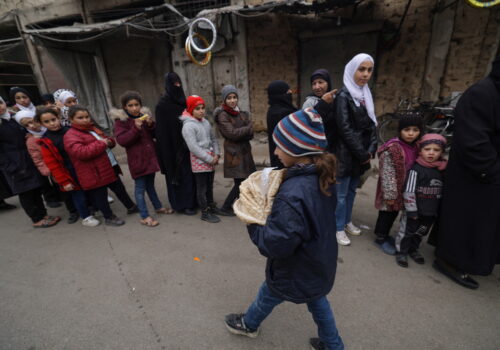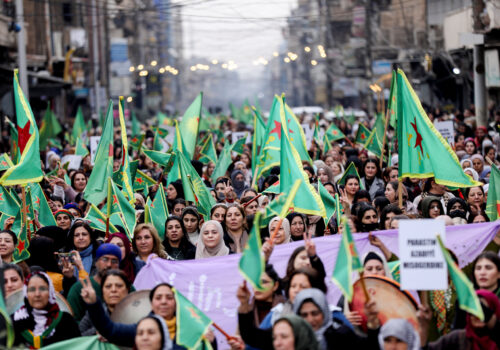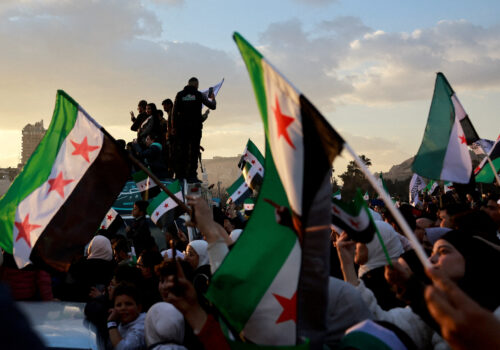Dispatch from Syria: ‘Syrians cannot focus on their future if they are still drowning in their past’
SEDNAYAH—Sobhi Shebah shuffles through the hauntingly silent halls of Syria’s infamous Sednaya prison. Most of the cells are totally emptied out, while others have a smattering of discarded clothing. He’s not quite sure what he’s looking for—there are no guards here, no authorities, no one to answer questions—but it’s the last place he saw his son alive.
Sobhi’s son, Sameer, was carrying out his military service when Syria’s revolution first broke out back in 2011. He, along with most of his unit, was detained and accused of wanting to defect to rebel forces. Sobhi says that for years, he paid exorbitant amounts in bribes to get the paperwork needed to visit his son.
“It was always through a fence, no more than five minutes. A guard would shove him forward and it was always just ‘hi, how are you, how’s the family,’” he remembers.
Sobhi is utterly emotionally lost and has been for years. He shows us the notification he received with his son’s alleged death date.
“I saw him after this date,” he says. “What is the meaning of this, what is the goal of this psychological torture?”
He begged and pleaded with the authorities for answers.
“They all just played games with us,” he remembers. “I told them if he’s dead, let me know. Once one told me to stop nagging him. ‘I can’t tell you more, he’s alive, but I don’t know where.’”
Sobhi’s voice trembles with quiet anger as he lists the names of the officers. He wants more than just answers: He wants to see the officers behind bars, and he wants to be able to confront those who took his son, who caused him so much pain.
I went to Syria at the end of December, a country I covered extensively in my former job as a senior international correspondent for CNN. I was back this time in my capacity as the founder of my charity, the International Network for Aid, Relief, and Assistance (INARA). One of the first neighborhoods my team and I visited was Darayya, a Damascus suburb that for years was bombed, besieged, and starved. In Darayya alone, local officials estimate that some fifteen thousand men were disappeared by the Assad regime. Mothers who used to tell their children “daddy is with the regime” are now at a loss, unsure how to answer the question “but mommy, the regime is gone, why isn’t daddy back?”
The pain felt by those searching for clues in the dark void of the former regime’s detention system is palpable.
Justice, accountability, and reparations are not just “catch words,” Joumana Seif, a prominent lawyer and Atlantic Council fellow, argues. Also a human- and women’s-rights activist, Joumana has been pushing for the creation of a Syria Victims Fund for years, so that the states that have been collecting hundreds of millions of dollars linked to violations of sanctions and other Syria-related crimes are no longer lining their own coffers but are giving that money back to the Syrian people.
SIGN UP FOR THIS WEEK IN THE MIDEAST NEWSLETTER
“It’s important for this damage, pain to be recognized and compensated, morally and also with some services and financial support,” Joumana explains. “Without this I think people will start to think about revenge, and this will be chaos. How to prevent revenge is to establish a clear transparent process of transitional justice.”
Time is not on Syria’s side, not when so much damage has been done, when the fabric of society is so frayed, when the country still is a patchwork of territories with de facto borders, and when there has been so much death and destruction. There have already been revenge attacks on Syria’s Alawite community—the sect with which the Assad family is affiliated.
Joumana knows the system well. Her father, Riad Seif, was a parliamentarian back in the 1990s and is a well-known voice of political dissent. He was twice jailed under the Assad regime.
“We need a process to go forward so that at least people see that there will be justice, and they can wait for that,” Joumana says.
As the rebel-forces-turned-rulers of Syria flung open the gates of the Assad regime’s prisons, a flood of hope and dread swept over the families of the missing.
“When the 8th of December happened, I was so scared because I thought that’s the end of the journey and now I will either know that my father is alive or no, that he’s not alive,” says Wafa Mustafa with The Syria Campaign. She is one of the most prominent and outspoken voices for the families of Syria’s missing.
“He’s here, I don’t know how, I don’t know in what form. I feel he’s here, but at the same time, I cannot see him. I’m this close, but I cannot find him.”
Wafa’s father disappeared from their Damascus home in 2013, forcing Wafa and the rest of her family into exile. He was always a dominant force in her life, as a father, a hero, a source of comfort, and a guiding light. The two were especially close, and both were highly politically active, first closely following as the Arab Spring erupted in other countries and then actively partaking in demonstrations in Damascus.
Since fleeing, first to Turkey and then onwards to Germany, Wafa has been relentless in her demand for answers, standing outside for hours in the freezing cold or sweltering summer heat, holding solitary vigils or joining others in holding photographs of missing loved ones. She has held and participated in countless press conferences, panels, meetings, and media appearances.
Now back in Damascus for the first time, memories reemerge, of not just her father but also the ghostly faces of friends and fellow protestors who are dead or missing.
The need for the truth—for Wafa, the truth of what happened to her father—is a gnawing and raw wound, one that rips through the psyche of countless Syrians. There are an estimated 100,000 to 200,000 Syrians missing, according to the International Commission on Missing Persons.
“If you don’t bring to justice those who were responsible, how do you think people will feel about justice? How do you think that people will seek justice? Many will go for revenge, and revenge literally means no peace,” Wafa warns.
Prison papers, identification documents, and other files were not preserved in the chaos following the shockingly fast fall of the regime of dictator Bashar al-Assad.
“We have no clarity on any level. We don’t know what they are doing with the detainees, the files, the mass graves,” Wafa explains.
It took two months for representatives of the families of the missing, including Wafa, to finally get an audience with Syria’s new president, Ahmad al-Sharaa, and its foreign minister, Asaad al-Shaibani.
“I think it was good as a first step,” Wafa says. “This is just the beginning, and I hope that this meeting will be a step towards an actual plan and the real and serious work.”
A number of regime officials, including Assad, managed to flee the country. Much criticism has been leveled at Syria’s new rulers for not publicly asking that the deposed dictator be handed back over to Syria. While that may not be realistic at this stage, the people at least need reassurance that their new leaders recognize the importance of justice and accountability.
Joumana says there need to be steps toward establishing a hybrid court and that the trial needs to happen in Syria with international judges to guarantee that international standards are followed.
“The people themselves need to decide if there should be amnesty or a forgiveness process for lower-ranking regime members,” she explains. “There also needs to be justice and recognition for the crimes of forced displacement, sexual and gender-based violence.”
“We need to create our own model. It’s different from one context, one people, one area to another,” she says. “We can find a solution, we can tailor our process, our transitional justice, and we will create a very good example of this.”
Syrians cannot focus on their future if they are still drowning in their past.
“For years the Assad regime made us feel unseen. We, our detained loved ones, our wounds and our demands, we were unseen,” Wafa says. “I will feel seen when we see actual steps.”
Arwa Damon is a nonresident senior fellow at the Atlantic Council’s Rafik Hariri Center for the Middle East and president and founder of the International Network for Aid, Relief, and Assistance (INARA), a nonprofit organization that focuses on building a network of logistical support and medical care to help children who need life-saving or life-altering medical treatment in war-torn nations.
Further reading
Fri, Jan 31, 2025
The foreign aid freeze poses risks to US interests in Syria
MENASource By Diana Rayes
Postwar Syria faces a precarious economic and security situation and the United States’ assistance—or lack thereof—will play an outsize role in its outcome.
Fri, Jan 10, 2025
To help build the new Syria, the US needs to better understand the Kurds and Arabs of the northeast
MENASource By Ömer Özkizilcik
Washington should take note of the complexities in the region and not be bound by the past. The security of the entire region is at stake.
Sat, Dec 21, 2024
A US blueprint for Syria’s fragile transition
MENASource By
As long as HTS is willing to evolve and accept constructive criticism, the US should engage with the group. Ignoring Syria’s new leaders will not make them go away.
Image: A former prisoner of Sednaya is seen posing in a solitary cell in Sednaya prison. Photo by Ashley Chan/SOPA Images via Reuters Connect.


